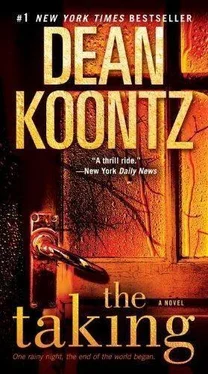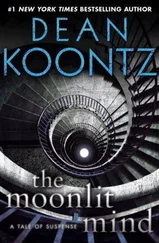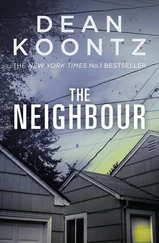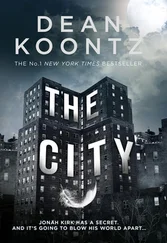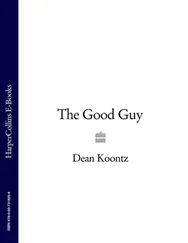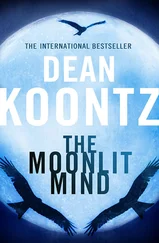A few minutes before three o'clock in the morning, the rain stopped.
She went to a window to pull aside a blind, but returned to her chair without doing so. She was afraid that clinging to the window would be some fungoid form, human faces screaming silently in the rounded surfaces of its strange flesh.
WITH DAWN, THE TRAMMELED SUN WAS FREED FROM chains of rain and nets of mist. As if rising in celebration, it painted the eastern heavens with the glow of roses, blued the remainder of the sky, and gilded the windows of Black Lake.
Molly, Neil, the children, and the dogs left the cold marble lobby of the bank for the warm morning in the street. They stood at first in quiet rapture, faces to the sky, mouths open as if to drink the sun's golden wine.
Only thirty-six hours had elapsed since they had seen sunshine, but Molly felt as if half her life had passed since she had last enjoyed this delicious warmth on her face.
One of the children was the first to notice the restoration of all things. "Hey, all the crap and creepazoids are gone!"
The strangulation of blackish moss had rinsed out of the trees and off the buildings, dissolved, and washed along gutters into storm drains.
The phantasmagoria of fungi, both those that walked and those that rooted, had vanished. What remained was right: sodden grass, dripping shrubbery, washed-out flower beds of gluey mud.
No monkeylike forms capered on the roofs, and nothing red and ravenous crawled through the trees.
Molly felt almost as though she had dreamed it all-or were dreaming now.
The earth had been taken by an extraterrestrial species as ruthless as might have been a race of intelligent crocodiles. The future had promised an end, and soon, to the human experience and the eradication of every human achievement. Yet the future that had been inevitable was not. Here in the still point, the dance of life went on, moment by moment.
She could not comprehend what had happened, what those princes from another star had intended to accomplish, whether they had in fact accomplished it, or why they had gone.
A flicker of alarm trembled her heart when she glimpsed movement in the sky, but she saw that this, too, was good and right. Overhead a hawk turned in a widening gyre.
The bark of a dog, not one of theirs, drew her attention to the north end of Main Street. The Irish setter, first seen the previous day, led three adults and a group of children toward the bank. The number of kids in that procession had increased since she had waved at them on Marine Avenue.
Another bark, this time from a curly-coated mutt of many breeds, announced the approach of another group from the south end of Main Street. One adult, seven children, and a golden cat that guarded their western flank.
Molly felt Neil's gaze, met his eyes, moved to him, and took his hand.
A third group-four adults, more than twenty children, and a host of dogs-called out as they approached through the small park across the street.
Of all the shocks and astonishments of the past thirty-six hours, none had affected Molly more profoundly than this, and certainly none had lifted her heart as this lifted it.
In a quarter of an hour, the last of nine groups arrived, and Molly was able to tally the surviving population of Black River, where once more than two thousand people had lived. Twenty-two adults, most of them parents. One hundred seventy-six children, more than half of whom were orphans now. Forty dogs, seven cats.
THAT GATHERING ON MAIN STREET OCCURRED ON Thursday morning, and by the end of breakfast, all twenty-two adults agreed that they must move the children out of Black Lake, to a more comfortable location in the lowlands to the west.
This was September, and winter would soon come to the mountains. With no electricity, with no natural-gas supply, and with no long-term source of fuel oil, they needed to establish a settlement in a more accommodating climate.
They spent that day assembling a caravan of vehicles and packing for the journey. Food, drink, clothes, mementos. Weapons, too, though they hoped they would never need them.
Thursday night, they bedded down throughout the bank, in every room but the vault. Most slept, but some could not, waiting for the sound of torrential rain.
The night passed without a storm.
Friday morning, they set out from Black Lake in a caravan of three school buses, two eighteen-foot box trucks, and fourteen SUVs. All the fuel tanks were topped off, and if they needed gasoline en route, they expected to be able to siphon it from abandoned vehicles.
They had no idea what to expect, but what they found to the west was more of what they had left. Blue skies empty of everything but birds. Sodden landscapes slowly drying out. Deserted towns.
To Molly, as to everyone, the War of the Worlds appeared to have ended in greater mystery than it had begun. Where had the victorious armies gone, and why?
Some freeway bridges should have been washed away; but none were. Molly saw little evidence of flood damage, even in areas where rivers would have overflowed their banks, drowning whole communities.
Occasionally they encountered snarls of abandoned cars, which had to be moved, but for the most part, the highways were deserted and offered easy travel.
During the westward journey, they encountered three caravans much like theirs. Many children and their tutelaries, numerous dogs, some cats, and even one pet parrot that had been taught some scraps of Emily Dickinson but no T. S. Eliot.
In the lowlands, where many millions had lived-and died-Molly expected to encounter suburbs that had become charnel houses stacked with corpses, the air thick with the stench of decomposition. But they saw not one cadaver, and the air was sweet.
Each of the other caravans had its own destination, and in time the Black Lake group proceeded on its own again, all the way to the Pacific coast and Newport Beach, where two of the tutelaries had family about which they were concerned.
Like the children of the mountains, the children of the coast had survived. The only adults were those who had rescued and protected the young. Many were parents whose sense of responsibility extended beyond their own families.
The residents of the coast welcomed newcomers. There were empty cities to be filled, a vast loneliness of streets and parks and malls and suburbs.
That Friday evening, Molly walked hand in hand with Neil to the beach and stood near the surf line to watch the sunset. A few ships lay broken along the shoreline, but none were visible on the sea.
What of China? Europe? England? Empires gone. And yet Earth abides.
Knowing the comfort that she took from the poet, Neil quoted two lines of Eliot: " 'Between the conception and the creation.' "
She continued: " 'Between the emotion and the response.' "
" 'Falls the Shadow,' " he finished.
The sun painted a benediction on the western sky, first gold and orange, then fiery red, then purple, which ushered in, but only for a few hours, the night.
SHE AND NEIL, VIRGIL, TWO OTHER DOGS, AND EIGHT children took for themselves an abandoned house on a bluff above the sea.
In the early weeks of this new life, they had little time for contemplation, for puzzling out what had happened to them and to the world.
Supermarkets and warehouses stocked with canned food would last the reduced population for years, though not forever. Strategies for long-term survival had to be devised, and much hard work had to be done to implement those plans.
Remarkably (or perhaps not), the only adult survivors, the tutelaries, proved to be a diverse lot with a surprising breadth and depth of knowledge and experience for such a small number. They were doctors, dentists, nurses, engineers, architects, carpenters, skilled mechanics
When a complete directory was compiled of those living on this immediate section of the coast, it seemed as though every surviving adult had been chosen not just to save the children but for the talents he or she could bring to this larger purpose.
Читать дальше
Конец ознакомительного отрывка
Купить книгу
